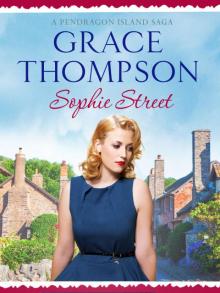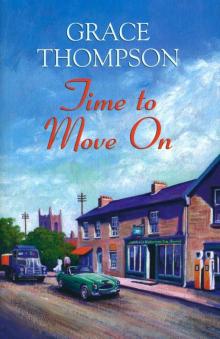- Home
- Grace Thompson
Sophie Street
Sophie Street Read online
Sophie Street
Table of Contents
Cover
Title Page
Chapter One
Chapter Two
Chapter Three
Chapter Four
Chapter Five
Chapter Six
Chapter Seven
Chapter Eight
Chapter Nine
Chapter Ten
Chapter Eleven
Chapter Twelve
Copyright
Sophie Street
Grace Thompson
Chapter One
Rhiannon and Charlie Bevan looked across at 7 Sophie Street and held each other close.
“Not another row,” Charlie muttered.
“Perhaps they’re just arguing about who makes the early morning tea,” Rhiannon said hopefully. “Come on, Charlie, it’s time to wake Gwyn.” She made her way to the bathroom and washed quickly before calling her stepson and reminding him that if he stayed in bed any longer he’d miss breakfast. That usually worked.
Charlie and his son, Gwyn, worked at Windsor’s garage and had to leave the house before eight o’clock. Rhiannon worked in Temptations, the sweetshop on the corner, and didn’t need to leave the house before five minutes to nine. “I think I’ll pop over and see Mam,” she said as she began preparing breakfast ten minutes later. “I dread to think of those two separating again.” She sighed. “Why can’t they behave?”
“The thought of having your father back as our lodger is daunting,” said Charlie, adding, “I think we’d threaten to emigrate if it came to that!”
Charlie and Gwyn were leaving to cycle to the garage when they saw Lewis storming out of number seven. “All right?” Charlie called.
“No it isn’t!” Lewis Lewis snapped. “I told her. I told her to buy batteries for the torch and she forgot again. She won’t carry one and I think she should on these dark mornings and evenings. I can’t give her and Sian Weston a lift if I’m out of town, can I? And she should always have a decent torch in her pocket. D’you think she’ll listen? No!”
Darting back into the house, Charlie came out and handed a small torch to his father-in-law. “Give her this, we’ve got a couple more. And please, Father-in-law, don’t frighten us by shouting at each other like that. Rhiannon always expects the worst; that you and her mam will separate again.”
“And I’ll end up living with you?” Lewis grinned. “I think that’s one reason why Dora took me back, mind, so I wouldn’t be a nuisance to you and Rhiannon.” He was chuckling as he went back inside to give Dora the torch.
Dora Lewis ran the Rose Tree Café near the lake, with her friend, Sian Weston. They had both been keen on cooking and when the opportunity came to develop their skills and begin a small business, they had taken it. Both had been separated from their husbands at the time: Lewis had gone to live with his long time mistress Nia Martin who had subsequently died, and Sian’s husband, Islwyn, had gone to live with his mistress, Margaret Jenkins of Montague Court.
“How are things with you and Lewis?” Sian asked as they took the first batch of scones out of the oven and put in a second baking.
“All right, I suppose, but we’re still a bit touchy with each other. Like this morning he flared up because I said I didn’t need to carry a torch. Daft, eh?”
“Not really, Dora. At least it shows he cares for you, wants to keep you safe. I don’t think Islwyn would ever have been that thoughtful. He was more likely to grumble that I hadn’t reminded him to carry one!”
Someone rattled the door and Dora looked up, her eyes bright, ready to complain. “Who can that be? It’s clear we aren’t open yet. Ten o’clock it says on the notice.”
“It might be that Carl Rees,” Sian said, going to open the door, wiping her floury hands down her sides. “Him that’s going to repair the windowframe, remember?”
She was right, and a tall, dark-haired young man came in carrying a carpenter’s tool bag.
“Is it all right to start on the repair now?” he asked. “I should get the wood patched and the prime coat on by lunchtime, then I’ll be back tomorrow to finish painting it. Right?”
“Who is he?” Dora asked, when the young man was outside, with a cup of tea and a sandwich provided.
“He lives in Bella Vista Road. You know,” Sian laughed, “the road with the beautiful view - of the new factory!”
“A bedsit?”
“Yes. I don’t know much else except that he does work for Jennie Francis, her that opened a paint and wallpaper shop and hoped to take trade from Westons. No chance of that, with my niece Joan and your son Viv managing Westons, is there?”
“On to a loser before she started,” Dora agreed.
“Carl Rees is very secretive by all accounts, but good at what he does. Carpentry mostly, but other jobs as well. It was Jennie Francis who recommended him to us. He does carpet fitting for her – when she manages to sell any, poor dab. I think things are going hard for her.”
* * *
When most people living in Pendragon Island needed paint, wallpaper, carpets or small items of furniture they went to Westons. For the remaining few, Jennie Francis’s small shop on a side road not far from the church was an alternative. Jennie stocked fewer lines but was willing to collect their requirements from the wholesalers and deliver them the same day. In this she was helped, not by her husband, who worked in the shipping offices on the docks, but by a casual worker, Carl Rees.
Carl fitted carpets, collected and delivered paint and wallpaper and would even decorate rooms, if required. He also did small carpentry jobs, like fitting shelves and making cupboards, tending to prefer this more skilled work to the mundane collection and delivery service Jennie required.
Jennie had begun her business with the assumption that her personal service and the smallness of her enterprise would wean people away from the larger and still expanding Westons. Part of her conviction had been based on the fact that Arfon Weston had been charged with theft and arson, having set fire to his own premises to recover insurance money when his business was failing. In this conviction she had been wrong.
For a while customers had trickled in, some out of curiosity, some to buy, but most had preferred the wider choice of Westons. She was having to face the fact that, unless she could find a way of increasing her sales, she would soon have to close.
Arfon Weston’s large shop was managed by Viv Lewis and his wife, Joan, who was Arfon’s granddaughter. Together Viv and Joan had rebuilt the business, raising it from just an outlet for wallpaper and paint, to a successful furniture showroom as well. Lucky Arfon Weston, Jennie sighed.
She was checking the totals on her till roll and writing them into her account book preparing to close for the day. She knew she would have to spend the evening working on her accounts, trying to decide whether to ask for a further loan or gradually close down the business. Carl came in, having washed the van and collected together the rubbish – wrappings, unwanted advertising boards, oddments of carpet and underlay – left from the day’s jobs. Two bedrooms fitted from small remnants, with not enough profit to pay for Carl’s time.
“I might have to close before the end of next month, Carl,” she said, as he picked up his coat and shrugged it on. “I’m sorry.”
“Can’t you sell it as a going concern? Better than closing it I’d have thought.” He looked down at her from his six feet four, his dark eyes softening, as pity for her disappointment filled his mind. She had worked so hard, and even tried a bit of cheating, getting information about the plans being made by Westons, and offering makes of carpet before they added them to their stock, but it had been hopeless. He’d always thought it would fail. Westons, with the go-ahead Viv Lewis in charge, was impossible to fight.
&nb
sp; “What about your old man, won’t he chip in a bit more? You could branch out into something that will bring people in.”
“Such as?” she asked wearily. “Viv Lewis has done it all.”
“Why not specialise in carpets and curtains and forget the rest? You could employ a professional designer.”
“Too expensive.”
“Someone young and not yet greedy?”
She shook her head. “I just don’t have the capital.” Or the support, she added silently.
When Carl had gone she sat for a long time looking at the sales and measuring the stock, working out the possible reductions if she were to have a sale. An hour passed and another, and it was almost eight o’clock when she came to with a shock and hurried from the shop. Peter would have a late dinner again and he hated eating later than seven. Her thoughts changing direction, she busied herself working out a meal that could be quickly prepared. She decided on cold meats, salad and coleslaw, even though the weather on this January day was more suitable to something hot. Unable to enthuse over the mundane subject of food, she switched back to thinking about the business.
She thought about Carl’s suggestion as she drove home. Curtains and carpets would make a natural combination, and it would be a relief to forget about wallpaper and paints and the boring accessories that went with them, but where would she find the money to expand? Advertising would be costly too but, without it, nothing she did in her out of the way premises would succeed.
Expand or give up? Her mind was going round and round considering the alternatives. As she opened the front door, she heard her husband in the kitchen and called, “Peter? Sorry I’m late, darling, I was talking to Carl.”
“You’ve forgotten about this evening then?”
Puzzled, she went to the kitchen door and saw that Peter was dressed in his best suit and obviously ready to go out. But where? He was standing, eating an untidily made sandwich and leaning over the sink to avoid marking his clothes. His eyes were shooting arrows of anger in her direction. The fact she had forgotten was clear on her face.
“Don’t worry, Jennie, I’ll go on my own. Again.”
“I’m sorry, I—” How could she admit she had no idea where they were supposed to be going?
“The leaving do?” he supplied. “The leaving do for Freddy Parker?”
“Give me twenty minutes and I’ll be ready.” She turned to go upstairs but he threw down the sandwich and caught hold of her arm, thin, bony and suddenly repulsive to him. “Don’t bother.” He released his hold of her as though throwing her from him, and left the room. “Don’t wait up. I plan to be very late.”
He didn’t slam the door when he left – that was something Peter never did – but Jennie opened it and called after him, “Give my best wishes to Freddy.” Then she slammed it.
She had a bath and, in her dressing gown, sat and went through the books once more. The loan from Peter’s parents was the biggest problem. They insisted on regular weekly payments and it was draining her. Instead of adding to her stock, she was having to pay them back and, although she knew they would have to be paid, she wondered whether they could be persuaded to delay any repayments for six months, to give her a chance to get things on a stronger footing. On impulse she phoned them.
After the usual rather formal pleasantries, she began to explain about the need to plough back any profits until the business was on its feet but Peter’s father cut her short.
“Sorry, Jennie, but Mum and I have been discussing this and we think its time our loan was repaid in full.”
“What? But you promised to accept weekly instalments until the shop was comfortably paying its way!”
“We went to Westons today and had a chat with Viv Lewis and that smart wife of his, Joan. She was a Weston you know, and is a very competent business woman. It’s so smart, that store, and they offer a good service. You should see their stock too. Marvellous it is. You can’t compete with them whatever we do to help.”
“Why did you go there? They probably thought you were spying.”
“I didn’t say who we were, of course, but from what Viv Lewis said, you don’t stand a chance. The position of your shop is wrong: too far from the shopping centre, without any passing trade. And you can’t offer a wide enough choice. Besides, Westons sell so many other things, and Joan Lewis offers a design and advisory service. Mum and I think you should sell while you’ve still got something to sell. Sorry, Jennie, but that’s what we think.”
Jennie sat with her eyes staring, unseeing, at the books in front of her, feeling as though she had taken a beating. She ached so much that she didn’t think she had the strength to go up the stairs to bed. The day’s post was piled up on the hall table. Peter rarely opened it, preferring to leave it to her to sort out. Forcing herself to leave her chair she gathered it up and took it upstairs planning to glance through it in bed.
Bank statements, gas and electricity bills she put on one side for Peter to deal with, advertisements and prospective distributers wanting an order, she threw onto the floor. The last one she opened and unfolded with curiosity. The letter was from the landlord of her shop, reminding her that the lease was soon ending and asking for confirmation of another year’s tenancy. She had six weeks to decide what she was going to do, but ten seconds were enough. Without Peter’s parents continuing to lend her the money she had no choice, she would have to close.
* * *
Another new business in Pendragon Island was showing none of the problems experienced by Jennie Francis. Edward Jenkins, previously of Montague Court, had opened a sports shop and it was increasing its turnover month by month. Mair Gregory worked for Edward full time and had never been happier. She had once worked as a maid for the Westons in their large house overlooking the docks, but Gladys and Arfon’s demands had been too much for her. Life in the sports shop was more interesting and far better paid.
Mair was twenty-two and not yet married. She’d had several boyfriends but none of them suited her. She lived at home with her father, who was a police constable, and was quite content. When she married she was determined not to become a house wife and mother with nothing more in her life than the weekly routine of what she saw as drudgery. Working as a maid for Gladys Weston had made her realise that for most women, life offered nothing more than being an unpaid servant. That wasn’t for her. Rich, he’d have to be, she laughingly told Edward when the subject of her boyfriends came up. “Rich, and boring, so no one else will want him, and at least fifty years old!”
But when Carl Rees came in late one afternoon, she thought she might change her mind. He was very tall, towering over her and filling the shop with his size. The day was gloomy and outside it was raining as though it would never stop. The shop was dark, even with the lights blazing in an attempt to add cheer, but he looked huge and to her, attractive and utterly fascinating in a ‘Heathcliff’ kind of way. The winter weather no longer seemed important. Edward smiled knowingly and stood back for her to attend to him.
“Do you have fishing gear?” Carl asked and, unexpectedly shy, Mair showed him the section where the rods and reels and accessories were displayed.
“Fond of fishing are you?” she asked stupidly, as he tried out the whip of a fly-fishing rod.
“Why else d’you think I’m buying?”
“For a present? Hanging about waiting for the rain to stop?” she snapped back, embarrassment making her angry.
“Sorry. Yes, I do like fishing and I want a beach rod, but I was looking at the fly rods out of curiosity.”
“I expect you know Viv Lewis who works for the Westons then, if you like fishing? He and Jack Weston are always off hoping to catch fish for supper.”
“I wouldn’t think Viv had much time, running that busy shop.”
“I don’t think he goes as often as he used to. Both he and Jack Weston are married now so things have changed for them.”
“Where do they go?” Carl asked. If Jennie was closing down then it might be a good i
dea to get to know the manager of Westons. They were sure to use more than one carpet fitter at times.
“The docks after mullet, the river after sewen. And salmon when they get a chance.”
“I’ll have a word, see if they can recommend a good spot.”
He didn’t buy the rod. Thinking it might be worth a second visit to talk to Mair again, he made an excuse and said he’d be calling in the following day, about lunchtime. “You can share my sandwiches if you like,” he said, with a grin that weakened her knees.
“I go home most days,” she said, then added, “Except Saturdays. We’re too busy for more than a quick snack then. I usually go to the café.”
“Saturday it is,” Carl said, then wondered why he had bothered. Mair didn’t look the sort who was ready for some fun. She was attractive enough, plump, just as he liked them. But as he was unable to consider more than a brief fling and no commitment, she was worth a second visit.
On Saturday, they ate in a small corner café some distance from where she worked. Best if they weren’t seen together. She was amusing, describing the customers and their wants, explaining about how she had started working for Edward Jenkins. “You still live at home?” Carl asked.
“There’s just me and Dad,” she told him. “He’s a policeman and he works shifts, so I have to stay and look after him. I don’t know what will happen when I get married,” she added coyly, and Carl swiftly changed the subject. Even on a first meeting that was dangerous ground.
* * *
Viv Lewis knew Carl Rees by sight although they had never spoken. He had watched the progress of Jennie Francis’s business with interest although he no longer had fears of her overtaking Westons. He had started managing the company after a series of disasters had brought it to the brink of closure. With Joan Weston helping, and eventually marrying him, he had worked to bring Westons into its present successful position as the first place people came when they were redecorating and refurnishing.

 Nothing is Forever
Nothing is Forever Friends and Secrets
Friends and Secrets An Army of Smiles
An Army of Smiles Sophie Street
Sophie Street Gull Island
Gull Island Facing the World
Facing the World The End of a Journey
The End of a Journey Unlocking the Past
Unlocking the Past Goodbye to Dreams
Goodbye to Dreams The Weston Girls
The Weston Girls Paint on the Smiles
Paint on the Smiles Time to Move On
Time to Move On The Runaway
The Runaway